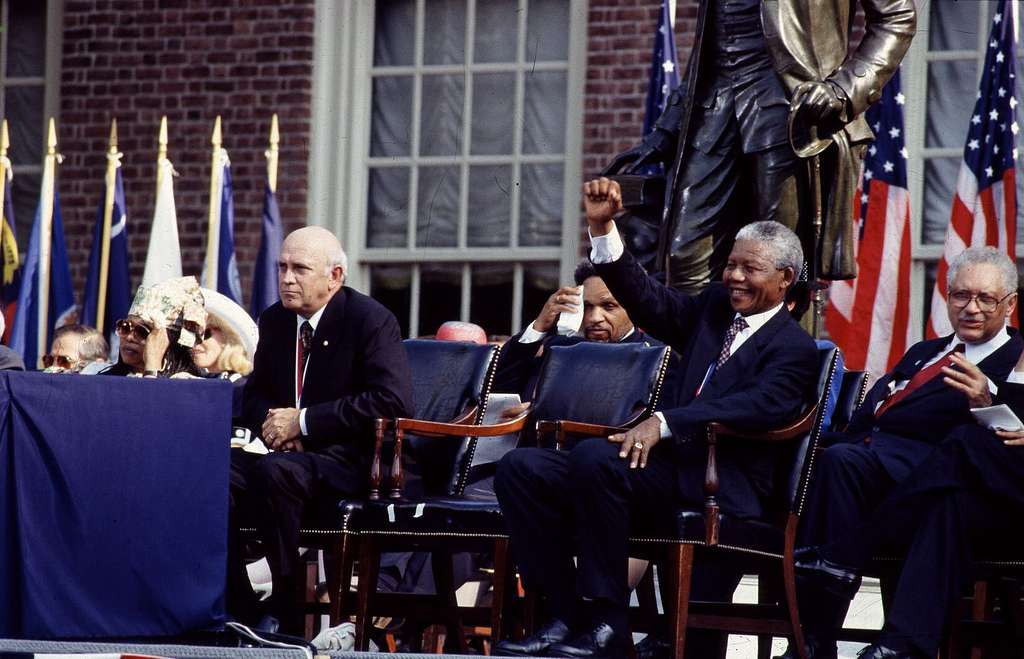News
Who's 'That Man'? The Perspective of a 20-Something 'Whindian' on FW de Klerk
To unban the ANC and 'play the game' in the negotiation processes of the early 1990s were smart moves. But does someone deserve an award in a game of chess if they can see where the game is headed, and bow out gracefully by shaking hands with their opponent as opposed to playing until they're check-mated? I think not.

I was born at the end of FW de Klerk's administration in 1993 to an interracial couple: an “Indian” mother (who identifies as a black South African, in the Biko sense) and a white father. To some people I look (and sound) white; to other people I look Indian, but for a lot of people I occupy an uncomfortable racially ambiguous space which prompts the question, “what are you?”, sometimes phrased a bit more politely, and usually within the first five minutes of the meeting.
I've played with different answers to the question, but I've settled with the explanation “my mother is Indian and my father is white, so I'm a Whindian”. Sometimes people say “oh, cool” and move on, but other times this makes people uncomfortable. They want to “box” you in so that they feel more comfortable.
I was once interrogated by an older white woman who insisted that my parents must have “registered” me as “something” (under the apartheid Population Registration Act, 1950, which FW de Klerk repealed in 1991, two years before I was born). She repeatedly asked me, “but what did your parents register you as?”, to which my answer was, “they didn't”. She couldn't comprehend my answer, but that's really not my problem.
The Prohibition of Mixed Marriages Act and the Immorality Act were both repealed by De Klerk's predecessor, PW Botha, in the late 1980s (when it was clear that the apartheid system was falling to pieces), making my parents' marriage and my existence “legal”. So, I wasn't “born a crime”, as mixed-race South African comedian Trevor Noah refers to himself.
Unlike my parents, my ID number does not indicate a race. I am still, however, required to fill out “equity group” on forms and to be consistent with this, but that's a discussion for another day.
What I want to write here is not about me. It's about “that man” whom I suspect whole-heartedly believed that superficial differences in skin tone, hair texture and so on were not superficial at all, but rather fundamental differences which denoted implications for one's life chance, education, where one lives and who one should love.
I distinctly remember sitting in a lecture for my course in Contemporary South African Politics in Political Science at Stellenbosch University (where I did my honours degree — the rest of my education, BA and MA, was at Wits University) when my lecturer made a passing remark praising De Klerk for his role in bringing apartheid to an end. My stomach churned and my jaw dropped. I couldn't look around the room to see my black peers' reaction without making an obvious scene, as I sat right in the front. I also couldn't get myself to put my hand up and say “that's offensive”, because that's not what you do when you're a minority. My lecturer's comment made me feel queasy, and here's why.
FW de Klerk came from a family line of leaders in the National Party. De Klerk's uncle, JG Strijdom, was the second apartheid prime minister, and his father, Jan de Klerk, served as a Cabinet minister under three apartheid prime ministers. De Klerk himself served as minister of education between 1984 and 1989, during which time he supported the continuation of “Bantu Education”, which has had lasting generational effects.
It is no coincidence that an image of a first-year university lecture hall may look “transformed”, but the graduation image four years later (particularly in STEM fields) tends to be a picture of predominantly white faces. The life chance for the black child, generally speaking, is poor. It breaks my heart that large numbers of us can get to university, but we're not on an equal footing when it comes to who survives, who thrives and who does not.
I don't believe De Klerk had some grand revelation that apartheid was fundamentally evil and that it ought to be done away with. I don't believe he welcomed inter-racial couples as guests for dinner, or that he suddenly changed his mind to believe that black children could excel at maths if given the chance. I'm certainly not the first to say this — it's been said in many media commentaries over the past few days that FW de Klerk was a pragmatist and not someone driven by moral reckoning.
“That man” won the Nobel Peace Prize with Mandela in 1993, which, in my opinion, he was not deserving of, but it made a convenient “happy ending story” for international news on the demise of apartheid. De Klerk was clever, for sure. To unban the ANC and “play the game” in the negotiation processes of the early 1990s were smart moves.
But does someone deserve an award in a game of chess if they can see where the game is headed, and bow out gracefully by shaking hands with their opponent as opposed to playing until they're check-mated? I think not.
De Klerk was not a “hero” and it makes me ill when (white) people speak of him as if he was. He was clever and tactful, but that's it. He never made any apology for the evil that was done by apartheid, or the lasting aftermath of apartheid with which my generation is grappling.
In his statement before the Truth and Reconciliation Commission in the late 1990s, he protested against the 1973 international assignation of apartheid as a crime against humanity. He reaffirmed this position in 2020 in a public statement.
“That man” was not a hero.
But fine, if we must give him credit for “undoing” something awful that should never have happened in the first place, I'll acknowledge that at the time of the early 1990s when I was born, there was the possibility that South Africa could descend into a bloodbath. And so the “peaceful” negotiations and unbanning of political parties are perhaps worth acknowledging.
This article originally appeared on Daily Maverick
Photo: Wikimedia Commons



